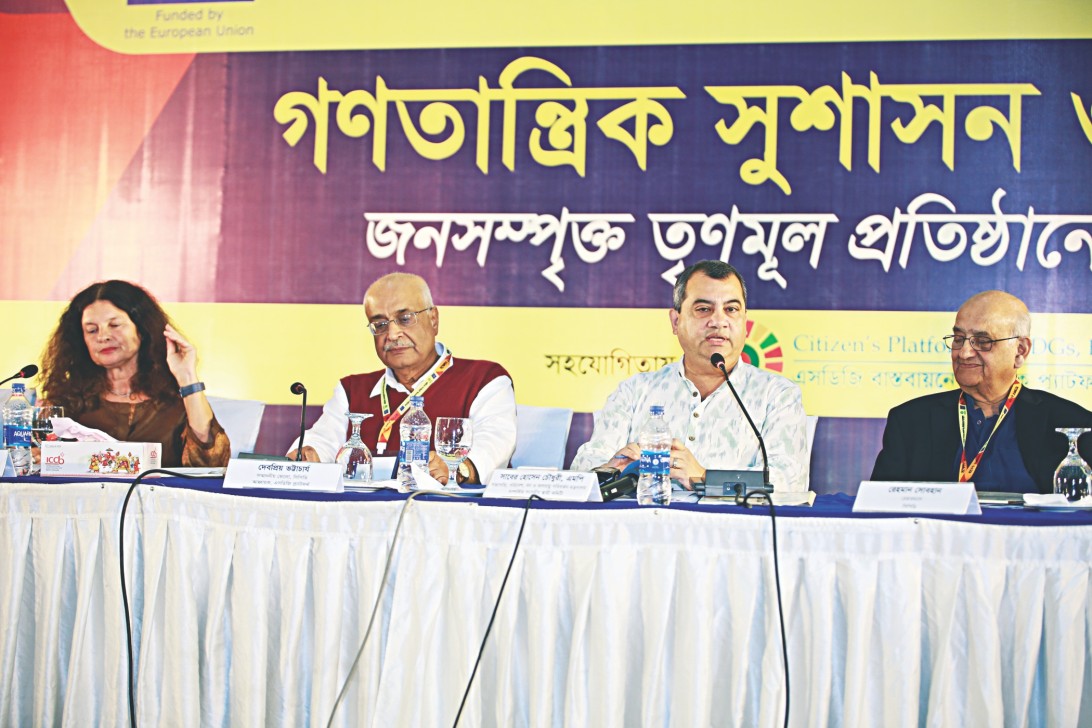People’s participation in public service delivery key to attaining SDGs

Enhancing accountability and widening space for citizen’s participation in the delivery process of public services are vital to realise the Sustainable Development Goals in Bangladesh, speakers said yesterday.
The recommendations came at a national conference on “Democratic governance and development: Role of grassroots citizens organisations” organised by the Oxfam and the Centre for Policy Dialogue (CPD) at the International Convention City Bashundhara in Dhaka. The conference was organised in partnership with the Citizen’s platform for SDGs, Bangladesh.
The speakers said a number of communities across the country are lagging behind when it comes to exercising the rights of access to public services due to critical challenges.
So, the government needs to focus on strengthening coordination among local authorities to ensure smooth implementation of national policies at local levels.
Prof Rehman Sobhan, a renowned economist, raised questions on whether there is a shortage of funds or a problem in allocation for the SDGs.
He said monitoring the funding process, allocation and implementation was essential to achieve the SDGs.
Prof Sobhan, also the chairman of the CPD, emphasised people’s participation in attaining the SDGs as without their participation no development can be sustained and no country can move forward.
He urged lawmakers to come up with the achievement of the SDGs in their constituencies in parliament.
“Finally, it has to be looked into whether the target groups got the expected benefits, and if not, what the loopholes are and where more attention should be given,” he added.
Saber Hossain Chowdhury, chairman of the parliamentary standing committee on the ministry of environment, forest and climate change, said the government is committed to ensuring sustainable development.
He said all stakeholders must be engaged to develop the country.
He said the government would continue to take necessary steps to ensure transparency and accountability in the delivery of public services and the implementation of national development policies at all levels.
Hafiz Ahmed Mazumder, a lawmaker and a member of the parliamentary standing committee on the ministry of planning, said the crucial target of the SDGs is education and emphasis should be given there.
“If we can achieve the goal of education, other targets will be achieved automatically. We spend only 2 percent of GDP on education but we have to spend 6 percent. We have limitations but we are trying to increase the allocation.”
Debapriya Bhattacharya, a distinguished fellow of the CPD, and the convener of the Citizen’s Platform for SDGs, Bangladesh, said that the pledge of the SDGs is to leave no one behind from the development process.
He said it is a must to ensure that the voices of marginalised people of hard-to-reach areas of the country are heard and reflected in the national development policies.
Rensje Teerink, ambassador and head of delegation of the EU to Bangladesh, said the role of NGOs and civil societies is very important to attain the SDGs.
Referring to the recent Gender Gap Report, she said the progress of Bangladesh is tremendous and is an example to many other countries.
Fahmida Khatun, executive director of the CPD, said if people are not involved in economic policy-making, economic benefits will not be equally shared among the people.
She said that the marginalised people and the backward population should be included in the journey of development.
Dipankar Datta, country director of the Oxfam Bangladesh, said all people should work together to achieve the SDGs. “We hope we will be able to do so.”
The Oxfam Bangladesh and the CPD are jointly implementing a project titled “Enhancing the participation of community-based organisations and civil society organisations in democratic governance in Bangladesh” with support from the EU.
The project aims to enhance the participation of vulnerable and marginalised communities in democratic governance in order to ensure accountability in public service delivery by the government.
The project is being implemented in 13 sub-districts located in hard-to-reach areas to implement eight SDGs related to poverty, zero hunger, quality education, gender equality, clean water and sanitation, decent work and economic growth, reduced inequalities, and climate change.
